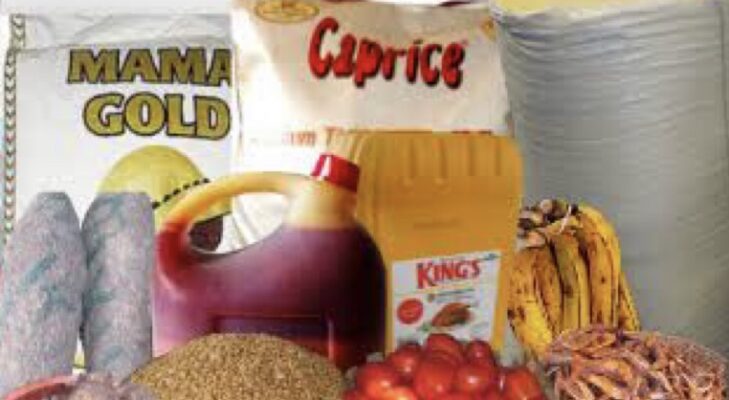Consumers in Benue, Abia, Borno, Yobe and Adamawa states are rejoicing over the sharp drop in prices of most foodstuffs in markets.
A cross-section of consumers said on Sunday in the states that prices of most foodstuffs, especially grains, had dropped significantly.
A Makurdi resident, Victoria Ogwuche, said she could now buy a mudu of beans at the rate of N1,500 as against N2,300 in 2024.
Mrs Ogwuche said she could now purchase a half tin of rice (half of 25 kg bag) for N12, 000 as against N19, 000 it was sold for in 2024.
Another consumer, Member Nyor, stated that it was difficult to prepare kunu (a local drink) and drink in 2024, but she could now buy a mudu of guinea corn for N300 as against N800 it was sold in 2024 and early 2025.
However, while consumers are rejoicing over the crash in foodstuff, traders are lamenting over the losses they had incurred in the process of buying and hoarding.
Onyemowo Ejeh lamented that she bought some 50 kg bags of beans for N120,000 each in December 2024 only for the price to reduce to N85,000 each in 2025.
Ms Ejeh also said she bought some 50 kg bags of maize for N85,000 each in January this year, only to now sell them at N45,000.
“I also bought medium sized (50 kg) bags of Bambara nuts for N185,000 in January this year, and now they are pricing a bag for N90,000. I have not been able to sell the Bambara nuts because the loss of N95,000 on each bag is too much to bear,” Ms Ejeh lamented.
Similarly, Joseph Okoh stated that he bought some 50 kg bags of Guinea corn for N70,000 each in January but they are now being priced at N45,000 each.
Mr Okoh said he wished to sell even at the low price, but buyers were scarce now because of the excess commodity in the markets.
According to him, the hoarders are now doing panic sales as they do not want to lose everything.
He said that many farmers were also sad about the drop in prices of foodstuff, saying that they purchased farm inputs at exorbitant prices and could not recoup their investments from their harvests.
An economist, Jacob Idoko, said that the government could only sustain the current prices of food stuff if they subsidised prices of farm inputs for farmers.
He stated, “If the government wants to sustain the present prices of food stuff, it must subsidise farm inputs for farmers. If not, no farmer will go back to the farm anymore and if they do not go back to farm, I assure you that prices of food items will go higher than they did in 2024.’’
Also, drop in foodstuff prices are noticed across markets in Borno, Yobe and Adamawa states.
A survey conducted in major markets in Maiduguri, Damaturu, Yola-North and Numan, indicates a steady decline in the prices of rice, maize, beans, pepper, millet, spaghetti and cooking oils, compared to the prices earlier in the year.
At Monday Market in Maiduguri, a 50kg bag of rice sold between N78,000 and N82,000 in August and September, now sells for between N64,000 to N65,000. Also, a 100kg bag of maize that previously cost between N60,000 and N65,000 now goes for between N40,000 and N45,000.
Similarly, the price of white beans had also dropped from an average N105,000 per 100kg bag to N85,000, while a basket of fresh pepper, which traded for as high as N70,000 to N85,000 at the peak of its scarcity earlier in the year, now sells between N6,500 and N8,500.
A 100kg bag of millet now sells around N46,000 as against N65,000 sold three months ago.
Similarly, a sorghum had also dropped to about N38,000 from N50,000 to N55,000 within the period under review.
A grains dealer at the market, Haruna Bukar, attributed the decline to increased supply from local farmers and enhanced access to farms, following recent security improvements in parts of Jere, Konduga and Mafa Local Government Areas.
He said, “We are getting more paddy rice and maize from communities around Zabarmari, Muna, and Dusuman. Prices came down because supply increased.’’
A beans and garri retailer in the Baga Road’s Market, Amina Umar, said the improvement was welcomed but warned that it might be temporary.
“Customers are happy, but we traders fear that once this harvest passes, prices will climb again because we don’t have storage. If the government provides storage centres, we can buy in bulk and keep prices stable,” she said.
A pepper seller, Fatima Mohammed, said the drastic fall in pepper prices followed availability of the perishable item due to influx of new harvests from farms in Biu, Shani and Damboa areas.
She said that the surge in prices of perishable items largely had to do with the high cost of transportation.
Ms Mohammed called on the state government to formulate policies supporting farmers to transport their produce to the market.
A retailer of sorghum and millet at Tashan Bama’s Market in Maiduguri, Babagana Lawan, said insecurity and lack of affordable transportation remained the biggest threats to price stability.
“Farmers around Gwoza and Bama produce a lot, but the cost of bringing their goods to Maiduguri is too high. Many drivers refuse to load because of attacks on the road. If new counter-insurgency strategies are introduced and roads are repaired, prices will remain low and even drop further,” he said.
A customer, Halima Musa, appealed to the government at all levels to sustain the drop in prices for the good of all.
At Bayan Tasha market in Damaturu, a big measure of white beans cost N3,000 as against N6,000 in February, while the price of a big measure of red beans stood at N2,400 as against N4,800 within the period under review.
A big measure of rice also dropped from N5,000 in February to N2,500, while the prices of big measures of maize and millet now cost N1,000 and N800 as against N2,500 and N2,600, respectively, in February.
Similarly, the price of a carton of spaghetti now trades for N13,000 as against N19,000 in February, while the price of Kings cooking oil is going for N15,000 as against N19,500 in February.
A trader in the market, Anwar Babagana, called on the Federal Government to sustain the policy shift towards importation to have affordable prices of foodstuff in the markets.
A customer, Gloria Thomas, called for the sustainability of grains import, but urged the Federal Government to also support farmers with farm inputs.
Contacted, an economist with the Yobe State University, Damaturu, Dr Binta Yahaya, attributed the drop to massive importation of grains by the present administration.
She stated, “Regarding the drop in prices of foodstuffs, Nigeria was facing severe inflation in the past two quarters, which brought untold hardship. The sharp decline in the prices is attributable to some policy changes by the present administration regarding importation of foodstuffs. It’s now widely known that there has been massive importation of wheat, rice, among others, to tackle the issue of food insecurity in the country.’’
Ms Yahaya said that the massive importation led to flooding of markets with grains nationwide, thereby forcing prices down.
“The law of demand and supply states that if there is too much supply of goods, prices will automatically go down,” she said.
Ms Yahaya, however, called on the government to apply a balanced approach to ensure that both customers and farmers were not negatively affected by the trend.
She suggested that while imports continued to cushion inflation, there was also a need for deliberate policies of making fertiliser and other farm inputs available and affordable to farmers.
Meanwhile, at Yola Central Market, a 50kg bag of local rice sells between N32,000 and N36,000, down from N48,000 to N55,000 three months ago.
A medium measure of maize, at the market, now goes for between N550 and N650, compared to N1,000 it sold earlier in the year.
While beans had dropped from N1,500 per medium measure to about N900 to N1,000 three months ago.
A trader in Numan market, Musa Mohammed, also said the government needed to balance the import policies with support for local farmers to avoid long-term food production challenges.
“Sustaining reduced prices would require stabilising the market prices and improving transportation systems for farm produce,” he said.
A customer at Jimeta market, Zulayya Suleiman, said introduction of policies of buying produce from farmers, input subsidy and establishment of more grain reserves in the country would help in stabilising prices
“These would protect farmers while keeping prices affordable for consumers,” she said.
An agriculturist and retired Director with the Federal Ministry of Agriculture, Dr Obadiah Noah, said the current trend could be sustained if the government invested in local production, improved irrigation systems and addressed insecurity on farmlands.
According to him, other measures include stabilising import policies, improving access to credit for farmers, and expanding rural road networks to reduce cost of transporting food.
He said the government must consider long-term impact, adding that while price reduction brings short-term relief, over-dependence on imports could threaten national food security.
Also, in Imo and Abia states, there has been a massive drop in prices of food arising from clement weather, favourable harvest and other economic factors.
A cross-section of residents, including traders, market men and women, and civil servants, who spoke in4 separate interviews in the two states, described the development as a temporary relief.
In Owerri, the respondents said that the price drop might not be unconnected with the rainy season gradually coming to an end.
They also said that the clement weather had helped both farmers and traders to preserve certain agricultural produce, such as tomatoes and pepper, leading to minor food losses.
A trader, Gladys Azubike, said that the stability in cost of transportation also helped positively in ensuring price stability and slight reduction.
A market survey in the city shows that a basket of fresh tomatoes, sold for N40,000 in the last two months, dropped to N38,000 and N35,000, depending on the quality.
A paint bucket of tomatoes, sold at N7,000, came down to N6,000, while a slightly bigger bucket, which sold at N8,500 is now N7,500.
Half-a-bucket of pepper, which previously sold for N4,000, now goes for N2,500, while a small quantity sold for N1,500 is now N500.
The sellers attributed the price reduction to a decline in rainfall, adding that tomatoes and pepper do better in the dry season.
Hamza Abubakar, who sells onions and tomatoes, said that price fluctuation is always occasioned by the availability or otherwise of an item in the market every season.
According to him, when tomatoes become cheaper, the price of onions goes up because they do better at different times in the year.
Mr Abubakar explained that nothing could be done to sustain the price reduction of any item once its season is over.
A 50-kg bag of local rice, which sold for N65,000, is now N60,000, while a 25-kg bag, sold at N32,500, is now N25,000.
Foreign rice, sold for as high as N90,000, is now N72,000 or N80,000, depending on the brand.
A custard bucket of beans sold at N8,000 is now N5,000. A custard bucket of garri, which sold for N2,500, now goes for N1,500.
The price of yam has remained relatively stable in the market since the harvest season.
In Abia State, a similar price situation also prevails across some food items in major markets in Umuahia and Aba.
Although some items recorded slight price decrease, others went up marginally.
At Apumiri, Isi Gate and Ubani markets, prices of food items, such as rice, beans, garri and oil, dropped, while those of yam, tomato and onions went up slightly.
Traders attributed the variations to supply fluctuations, seasonal factors and transportation costs.
At the Apumiri Market, a 50 kg bag of local rice sells between N45,000 and N70,000, as against N55,000 and N75,000, two months ago.
Also, a bag of beans goes for N95,000, as against N110,000, during the same period
Prices of oil also dropped slightly, as 25-litre palm oil sells for N55,000 as against N58,000 and N60,000, while 25-litre groundnut oil goes for N57,000 as against N60,000 and N61,000.
A four-litre paint bucket of garri sells between N2,000 and N2,200 as against N3,000 and N3,400, earlier in the year.
However, prices of some items rose sharply as a bag of onions went up to N90,000 from N75,000, while a basket of tomatoes moved up to N60,000, from N40,000 and N45,000.
The price of chicken remained stable at N6,000 per kilo, while mackerel (fish) rose to N4,000 from N3,500 per kilo.
A carton of sachet tomato now sells for between N6,000 and N7,600 as against N6,000 and N7,800.
At Isi Gate, the price of a 50-kg bag of rice ranges from N50,000 to N70,000 as against the least of N72,000, a few months ago.
A bag of beans goes for N90,000 and slightly above as against N120,000 in August.
A four-litre paint bucket of garri goes for N2,000 as against N3,500 and N4,000, while onions rose slightly to N120,000 as against N100,000 per big bag and corn remained stable at N60,000 per bag.
At the Ubani Market, a 50-kg bag of rice sells between N45,000 and N65,000, a significant drop from N90,000 two months ago.
A 25-litre keg of palm oil goes for N47,000, while groundnut oil sells for between N55,000 and N60,000.
Reacting to the price changes, a resident, Eucharia Ndukwe, said the slight drop had brought a brief relief to families.
“It is some relief that one can now buy three cups of good quality rice for N1,000 and medium-size yam for N2,000, enough to prepare a meal for a small family. With this, a poor family can feed with the little it has,” said Ndukwe, a mother of four.
A trader, Esther Innocent, described the fall in the prices of staple food items as a welcome development.
She said that her sales had improved, compared with what obtained two months ago, adding that lower prices encourage customers to buy more.
A frozen food seller, Blessing Ola, blamed the steady rise in frozen food prices on multiple challenges in the supply chain.
Mrs Ola said that high transportation cost, fluctuations in the exchange rates and a “price monopoly” among major distributors, were driving up wholesale prices, forcing retailers to sell higher.
She explained that increases in fuel and logistics costs, as well as import-related expenses, directly affect market prices, making it difficult for traders to maintain stable pricing.
A civil servant, Alozie Nwamuo, said that the reduction in the prices of rice, beans, garri and oil indicate better supply and drop in transportation cost.
Mr Nwamuo also linked the sharp rise in the prices of onions and tomatoes to seasonal shortages, high production costs, weather-related challenges and poor storage facilities.
Another civil servant, Ndubuisi Eke, said that the price variation in different markets reflected differences in supply access and4 distributor pricing.
Mr Eke urged government agencies to support farmers and improve transport and market monitoring to help stabilise food prices.
In Aba, foodstuffs sellers expressed delight over the prevailing price decline across some food items, which they attributed to the harvest season and availability.
They said the prices of the newly harvested farm produce were affordable but complained that the prices of the old varieties were still high.
Perpetual Ndidi, who sells yam at Clifford Road Market, said that old stock of Onitsha yam sells for N4,500, per sizable tuber, as against N3,500 about three months ago.
She said the price of newly harvested Benue yam ranged from N500 to N800 and above.
She said that while the Ogoja yam goes for between N7,000 and N9,000 per tuber, Benue yam sells cheaper because it comes in small sizes.
A garri seller, Serah Okezie, said that white garri goes for N1,200, per four-litre paint bucket, as against N2,600, three months ago.
She also said that a four-litre bucket of red garri, which sold for N2,400 in August, now goes for N1,600.
Ms Okezie also explained that six cups of white garri goes for N500, while the red variety sells N100 per cup.
She said that iron beans is N5,000 per four-litre paint bucket, and N350 per cup, while a paint bucket of Patasko beans is N4,500 and N300 per cup.
Ms Okezie said that rice produced in the South-East and other stone-free Nigerian rice sells between N4,500 and N5,000 a paint bucket.
No
A rice seller, Junior Akpan, said a 50-kg bag of local rice now sells for between N56,000 and N60,000 as against N60,000 and N70,000 three months ago.Ms
Mr Akpan said that foreign rice goes for between N70,000 and N80,000 per 50 kg bag as against N80,000 and N90,000, depending on the brand.
The respondents, however, argued that the price drop was not yet enough to significantly reduce the cost of living.
(NAN)





